Explaining the Edgar Allan Poe references in “The Fall of the House of Usher”
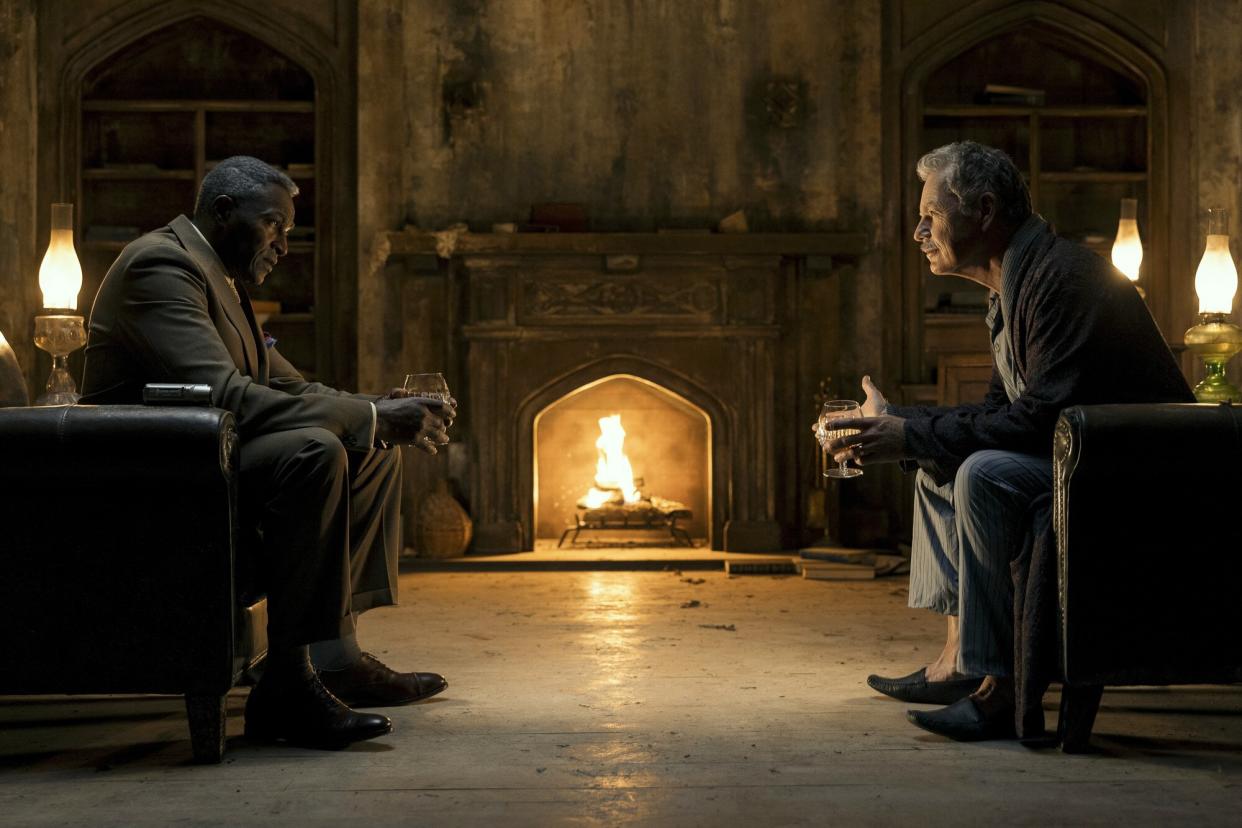
- Oops!Something went wrong.Please try again later.
- Oops!Something went wrong.Please try again later.
Warning: This article contains spoilers from The Fall of the House of Usher.
As fans of television creator Mike Flanagan have seen, the horror maven finds the fun in remixing classic literary works, rather than strictly adapting them for the screen. Such was the case with The Haunting of Bly Manor and The Midnight Club, which both took the premise from a specific work but then incorporated elements from the respective author's entire literary catalogue.
Flanagan takes the same approach to gothic poet Edgar Allan Poe's work with The Fall of the House of Usher, a limited series now streaming on Netflix. The eight-episode story follows the Usher family, led by patriarch Roderick (Bruce Greenwood) and his twin Madeline (Mary McDonnell), who have grown Fortunato Pharmaceuticals into a modern-day dynasty. At the height of their power, a supernatural entity from the siblings' past, the shape-shifting demon called Verna (Carla Gugino), arrives in their present to kill the heirs of the Usher fortune, digging up long-buried secrets in the process.
There are some clear references to Poe, such as the presence of the raven, but there are many more subtle elements that may have gone unnoticed, especially to the non-literary scholars of the age. Here are the big references to the famed writer's short stories and poems.
"The Fall of the House of Usher"

Eike Schroter/Netflix Carl Lumbly and Bruce Greenwood in 'The Fall of the House of Usher'
Let's start with the obvious...
The Fall of the House of Usher takes its name and some of its lead characters from Poe's 1839 short story, which follows an unnamed narrator called upon by an ailing Roderick Usher, the last remaining Usher family member along with his sister Madeline, in his hour of need.
The show kicks off with a similar premise: In the present timeline, C. Auguste Dupin (Carl Lumbly) arrives at the now-dilapidated childhood home of Roderick and Madeline so the cursed patriarch can confess the sins that led him to this moment. (Dupin, a Sherlock Holmes-esque detective, appears in more of Poe's work, including "The Purloined Letter" and "The Mystery of Marie Rogêt.") At the end of the drama, the death of Madeline and the collapse of the house upon the Usher siblings is reflective of the short story's conclusion.
"The Cask of Amontillado"
The Fortunato of Fortunato Pharmaceuticals is a nod to a nobleman from 1846's "The Cask of Amontillado," which told of a man named Montresor, who seeks revenge against Fortunato for numerous grievances. Fortunato's punishment is being chained to a wall in the catacombs and sealed away behind a wall of bricks, which happens to be the fate imposed on Rufus Griswold (Michael Trucco) by young Roderick (Zach Gilford) and Madeline (Willa Fitzgerald).
On a separate note, Rufus Griswold was Poe's nemesis who wrote a scathing eulogy for the poet under a pseudonym.
"The Premature Burial"
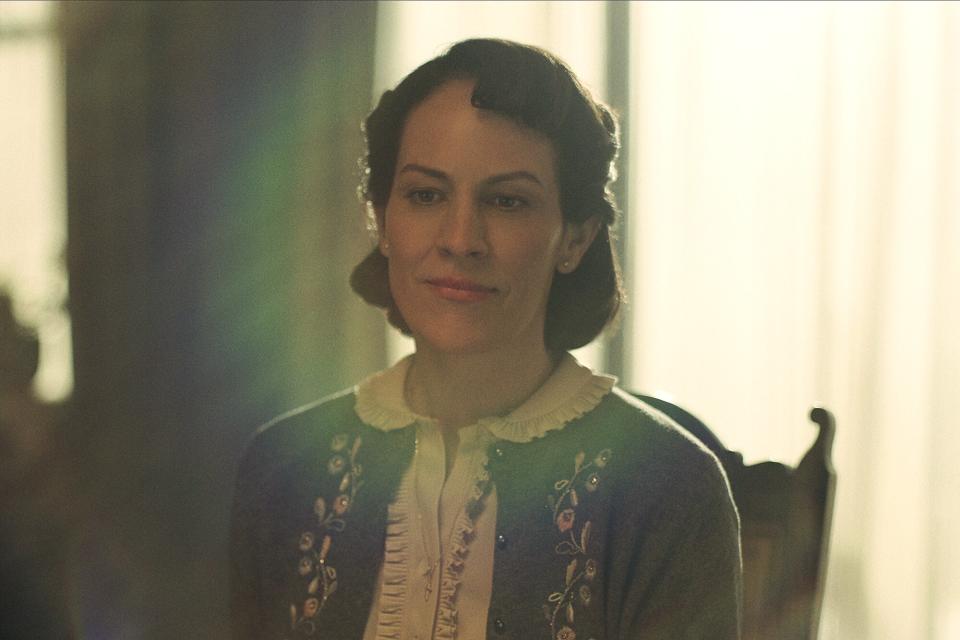
Netflix Annabeth Gish as Eliza in 'The Fall of the House of Usher'
Annabeth Gish (Midnight Mass) appears as Eliza, the mentally disturbed mother of Roderick and Madeline who conceived the children through an affair with her boss at Fortunato. Eliza is also the name of Poe's mother, while the character's arc on the show of being buried alive is inspired by 1844's "The Premature Burial." The short story tells of a man with a fear of being buried alive due to a rare condition that causes him to fall into a death-like state of unconsciousness. The name Victorine Lafourcade, played by T'Nia Miller (The Haunting of Bly Manor), also comes from this story.
"Ligeia"
The name Ligodone, Fortunato Pharmaceutical's miracle drug, is a variation on "Ligeia," the 1838 short story about an opium user who believes he is witnessing his dead wife come back to life.
"William T. Wilson"

Eike Schroter/Netflix Matt Biedel as BILLT in 'The Fall of the House of Usher'
Matt Biedel (Midnight Mass) appears as William T. Wilson, the fitness influencer husband of Tamerlane Usher (Samantha Sloyan). His followers know him better as "BILLT," a combination of his nickname Bill and middle initial. The full name hails from 1839's "William T. Wilson," about a man who meets someone that strangely looks like him and later becomes his actual doppelgänger — a premise that reflects Tamerlane's storyline and eventual death on the series.
"The Gold-Bug"
The 1843 short story "The Gold-Bug" follows William Legrand, who becomes enthralled by a gold-colored bug. The symbol of this insect is used as the logo for Tamerlane's company.
"The Tell-Tale Heart"

Eike Schroter/Netflix Paola Nuñez and T'Nia Miller in 'The Fall of the House of Usher'
"The Tell-Tale Heart," one of Poe's more famous works from 1843, focuses on a man who's trying to convince the reader of his sanity while describing a murder he has committed — not unlike Victorine, who inadvertently kills her lover and business partner, Dr. Alessandra Ruiz (Paola Núñez). Roderick looks upon his daughter in horror as her mutterings turn into madness at the sight of the heart mesh technology she inserted into a dead Alessandra's cut-open chest.
"The Murders in the Rue Morgue"

Netflix Aya Furukawa, Kate Siegel, and Igby Rigney in 'The Fall of the House of Usher'
Victorine's experimentations with chimpanzees is an allusion to "The Murders in the Rue Morgue," Poe's 1841 story about Detective Dupin (yes, the name of Lumbly's character) investigating the deaths of two women in the fictional Rue Morgue street in Paris. He determines a monkey to be the killer. Kate Siegel's Camille L'Espanaye, the Usher empire's PR maven, is named after one of the victims in the story. Camille, too, dies at the hands of one of Victorine's chimps.
Another reference to Poe's piece is the name Le Bon, which appears on Verna's name tag as she takes the guise of a security guard to stalk Camille in episode 3. In the context of the show, RUE also happens to be an acronym for Roderick Usher Experimental, which is the Fortunato subsidiary through which Victorine conducts her animal experiments.
"Some Words With a Mummy"
Roderick and Madeline have maintained a small collection of Egyptian artifacts over the years. Roderick, in his distressed state, eventually kills Madeline by mummifying her, which, to his sister's chagrin, is painfully unsuccessful. These are nods to 1845's "Some Words With a Mummy," which involves a revived mummy.
"The Masque of the Red Death"
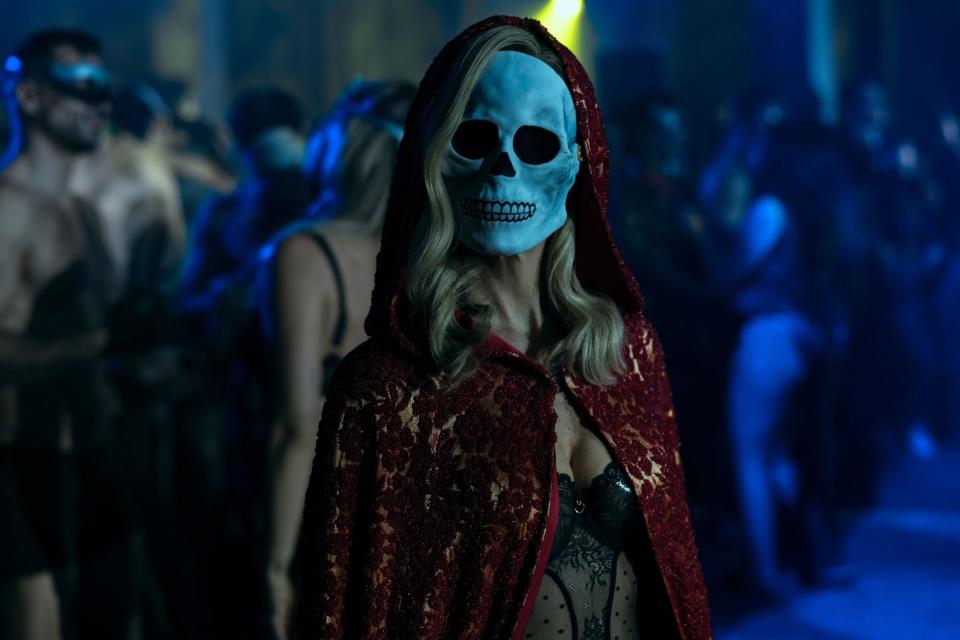
Eike Schroter/Netflix Carla Gugino as the demon Verna in 'The Fall of the House of Usher'
Sauriyan Sapkota (The Midnight Club) plays Prospero "Perry" Usher, the party animal bastard child of Roderick Usher. The character shares the same name (and fate) of the lead figure in 1842's "The Masque of the Red Death." Though, the warehouse orgy party is all new.
Poe's story sees Prince Prospero feeling paranoid over catching a plague called the Red Death, so he throws a masquerade ball for several noblemen in his abbey. The party is infiltrated by a mysterious figure dressed as a victim of the Red Death who then kills Prospero and his guests. On House of Usher, Perry throws a massive party in one of Fortunato's abandoned warehouses. Verna crashes the event disguised underneath a red cloak and a skull mask. The guests are killed when Perry turns on the sprinklers, not knowing they are connected to the warehouse's water tanks that have been storing all of Fortunato's illegally discarded chemicals.
"Never Bet the Devil Your Head"

Eike Schroter/Netflix Aya Furukawa and Igby Rigney in 'The Fall of the House of Usher'
Igby Rigney (The Midnight Club) plays Toby, one of Camille's two assistants. In a particular scene in episode 2, his boss exclaims "Toby, damn it!" upon learning he hasn't discovered who the supposed leak in the family is. This is a reference to the lead character of 1841's "Never Bet the Devil Your Head," which centers on Toby Dammit, a man who loses his head after seemingly making a bet with the devil.
"Metzengerstein: A Tale in Imitation of the German"
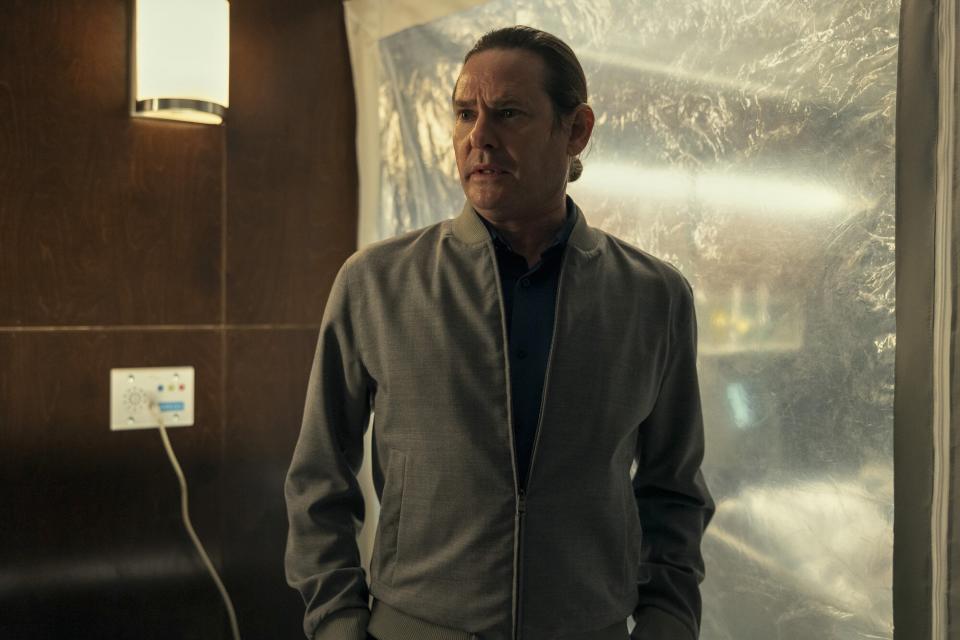
Eike Schroter/Netflix Henry Thomas as Frederick Usher in 'The Fall of the House of Usher'
Henry Thomas, a longtime Flanagan collaborator, plays Frederick Usher, Roderick's eldest son. Frederick is also the name of the lead character from Poe's "Metzengerstein: A Tale in Imitation of the German," the 1832 short story about the last surviving member of the Metzengersteins who's suspected of killing the patriarch to a rival family in a fire. Metzer, who's the name of the chemist credited with developing Ligodone, is a shortened version of Metzengerstein. More generally, House of Usher pulls some of the same themes, including being done in by one's hubris, for its 1979 timeline arc.
"Landor's Cottage"
Landor Pharma is the name of a rival pharmaceutical company acquired by Fortunato. It's a reference to Poe's 1849 story "Landor's Cottage," which, unlike much of the author's other works, is less horrific and more a descriptive piece of a lone cottage.
"The Narrative of Arthur Gordon Pym of Nantucket"
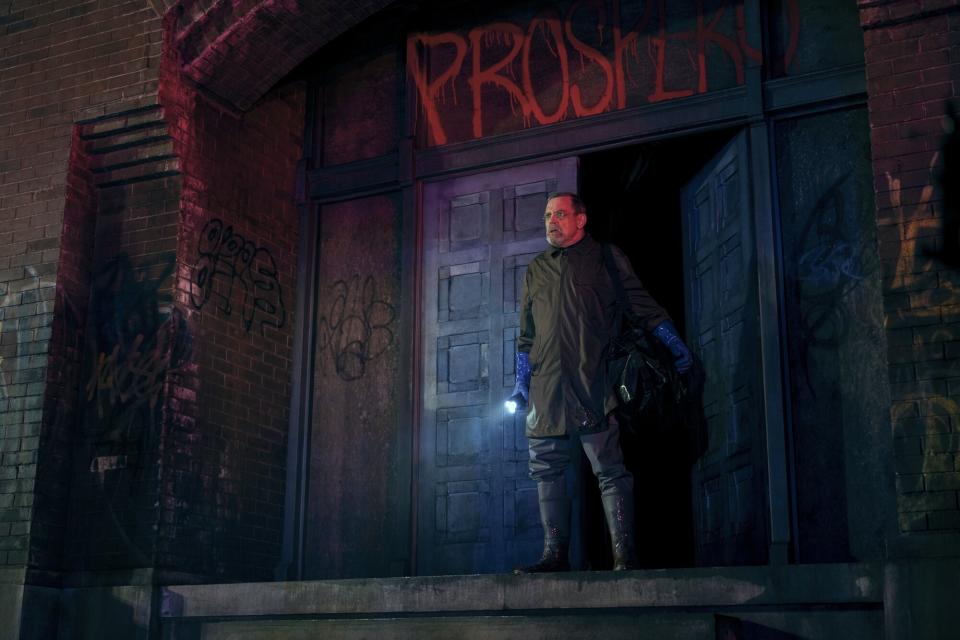
Eike Schroter/Netflix Mark Hamill as Arthur Pym in 'The Fall of the House of Usher'
Star Wars icon Mark Hamill plays Arthur Pym, the Usher family's undefeated attorney and general cleanup guy. The character name comes from 1839's "The Narrative of Arthur Gordon Pym of Nantucket," which chronicles the seafaring adventures of its titular figure after he boards a whaling vessel called the Grampus. A scene from episode 2 of House of Usher sees Frederick teaching his daughter Lenore (Kyliegh Curran) to build a ship in a bottle. On completion, he suggests that he name it Grampus, which is also the pet name Lenore used to call her grandpa Roderick.
Hamill's Pym is described on the show as having been an explorer in his time before the Ushers. He also cracks a joke (well, hopefully it's a joke) about "having Richard Parker for dinner." Cannibalism was a part of Poe's story for Pym.
"The Pit and the Pendulum"
Frederick, who suffers from claustrophobia in addition to a blossoming cocaine habit, dies in episode 7 after Verna drugs him with a paralytic, forcing him to watch helplessly as he's buried alive inside a demolished warehouse. A swinging blade that falls closer and closer toward his body slices his torso in half as a nod to Poe's The Pit and the Pendulum of 1842, about a prisoner of the Spanish Inquisition who's tormented by a vision of Father Time holding a sharp pendulum over his body.
"Annabel Lee"
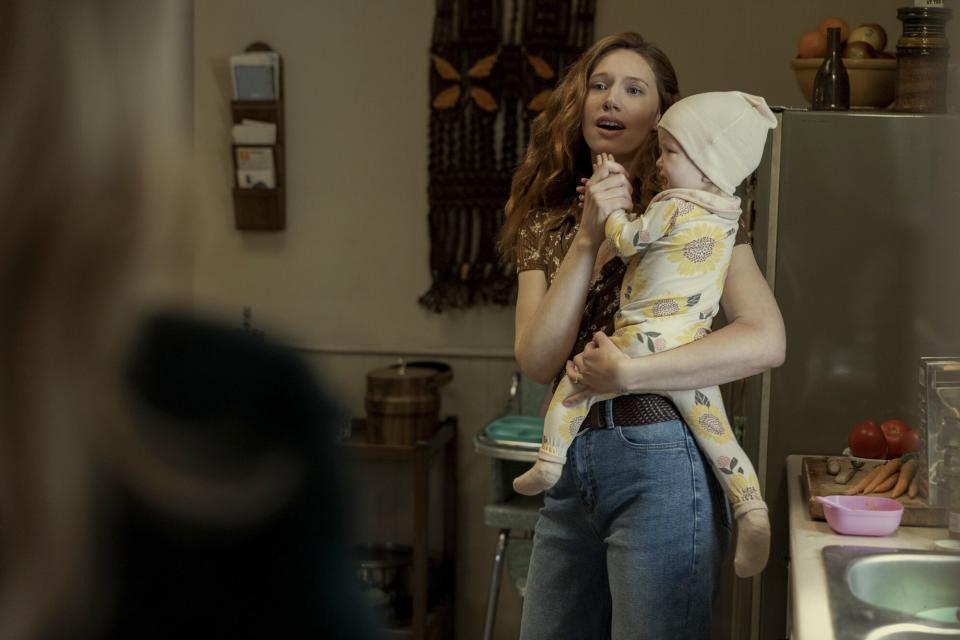
Eike Schroter/Netflix Katie Parker as Annabel Lee in 'The Fall of the House of Usher'
Katie Parker, another longtime Flanagan cohort, plays Annabel Lee, the first wife of Roderick in the earlier timeline and the mother of Frederick and Tamerlane. Poe's 1849 poem of the same name is about the death of a beautiful woman, whom the narrator is still in love with after her passing. This is similar to Roderick in House of Usher, which sees him haunted by the ghost of the only woman he's ever truly loved. Both Greenwood and Gilford's versions of Roderick recite pieces of Poe's poem in episodes 3, 7, and 8.
"The Black Cat"
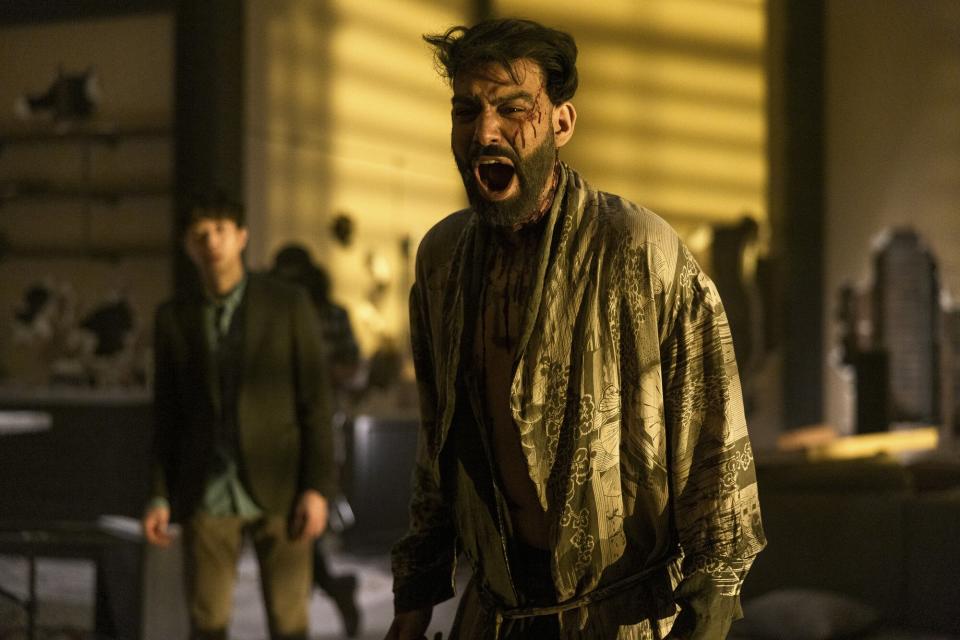
Eike Schroter/Netflix Rahul Kohli in 'The Fall of the House of Usher'
Poe's "The Black Cat," published in 1843, follows an animal abuser who cuts out the eye of his favored black cat after it bites him. Episode 4 of House of Usher shares the same title as this short story, which inspired the death of Napoleon "Leo" Usher (Rahul Kohli), who's tormented by Verna as a demonic black cat. Amid his scuffle with the feline, Leo pokes one of the eyes out of the cat's head.
"The Man That Was Used Up"
Published in 1839, "The Man That Was Used Up" sees its narrator meeting with a war hero named Brevet Brigadier General John A. B. C. Smith, who's lost most of his limbs and is mostly comprised of prosthetics. Dr. Brevet is a name that appears on some of the forged Fortunato documents in the '70s timeline.
"Spirits of the Dead"
At the joint funeral for Perry, Camille, and Leo in episode 5, the priest utters a passage that begins with, "In death around thee — and their will shall overshadow thee: be still." This is a passage from Poe's poem "Spirits of the Dead."
"Berenice"
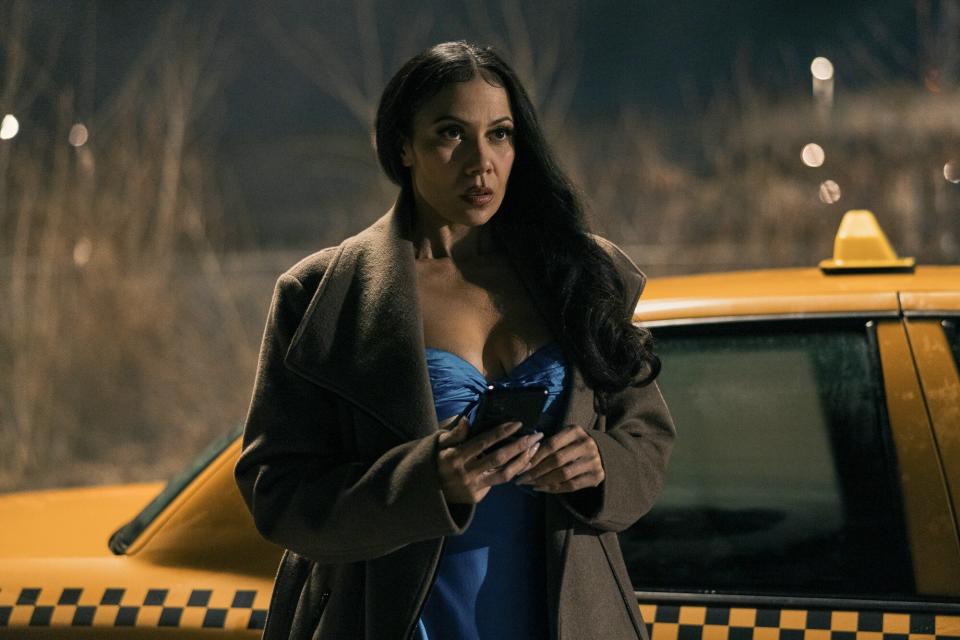
Eike Schroter/Netflix Crystal Balint as Morella in 'The Fall of the House of Usher'
As Frederick becomes more and more cruel to his wife Morella (Crystal Balint), who's bed-bound after surviving the acid rain shower at Perry's party, he becomes fixated on her smile and eventually rips out her teeth. This pertains to Poe's 1835 violent story "Berenice," which is about a man's obsession with a woman of the same name who falls increasingly ill. That character similarly focuses on the woman's teeth.
"Morella"
The name of Balint's character comes direct from this 1835 short story, about a woman who dies giving birth to a daughter that will later grow up to resemble her.
"The City in the Sea"
In episode 7, Madeline confronts Verna, hoping to renegotiate the terms of their Faustian deal. Verna recites one of Poe's poems, "The City in the Sea," which had previously been published as "The Doomed City" and "The City of Sin." The stanzas tell of a city ruled by Death personified.
"The Raven"
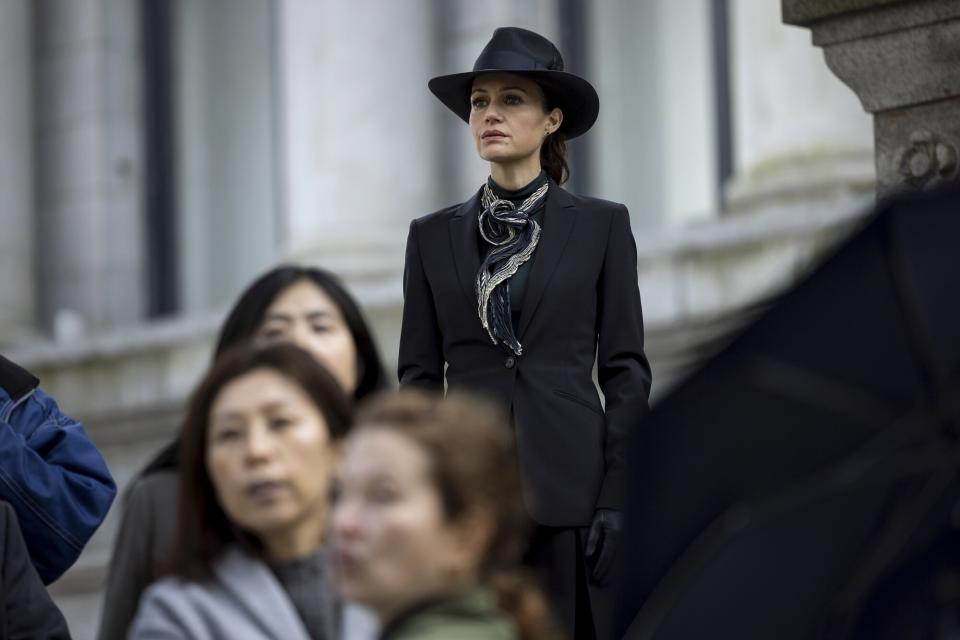
Eike Schroter/Netflix Carla Gugino in 'The Fall of the House of Usher'
And now for Poe's most famous work...
There are more obvious references to 1845 poem "The Raven" in House of Usher: Verna taking the physical shape of the black bird to haunt Roderick, the Usher patriarch receiving a slew of texts that read only "Nevermore," the title and some of Roderick's dialogue in the eighth and final episode of the series, and the name Lenore (Curran's character) being pulled directly from Poe's piece. Then there's the name Verna, which happens to be an anagram for Raven.
The Fall of the House of Usher is streaming now on Netflix.
Sign up for Entertainment Weekly's free daily newsletter to get breaking TV news, exclusive first looks, recaps, reviews, interviews with your favorite stars, and more.
Related content:

